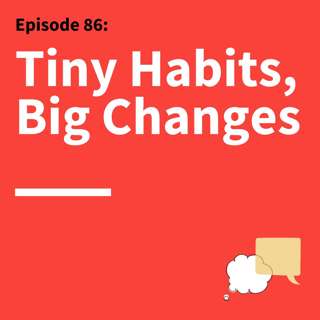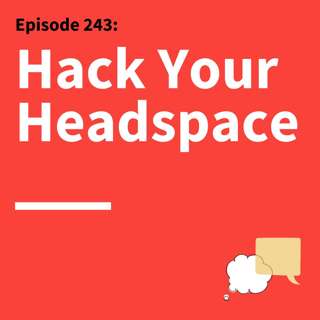
88. Rethinks: Leading From Home – How to Create the Right Environment for Communication
*This episode of Think Fast, Talk Smart won "Best Business Podcast Episode" at the 2023 Webby Awards.* “You’re not going to hit the mark with everybody, but you still need to be mindful of everybody,” says Jonathan Levav, a professor of marketing at Stanford Graduate School of Business. “That’s critical to create an environment where communication is effective.”In this podcast episode, Levav sits down with podcast host Matt Abrahams to talk about how to lead from home and how to foster an environment for creativity, innovation, and collaboration.It’s not just maintaining a company culture, it’s about establishing what that culture is online, Levav says. “How can you encourage those serendipitous conversations that tend to happen in person?”Connect:Premium Signup >>>> Think Fast Talk Smart PremiumEmail Questions & Feedback >>> hello@fastersmarter.ioEpisode Transcripts >>> Think Fast Talk Smart WebsiteNewsletter Signup + English Language Learning >>> FasterSmarter.ioThink Fast Talk Smart >>> LinkedIn, Instagram, YouTubeMatt Abrahams >>> LinkedIn ********Thank you to our sponsors. These partnerships support the ongoing production of the podcast, allowing us to bring it to you at no cost.Strawberry.me. Get 50% off your first coaching session today at Strawberry.me/smart
2 Maj 202324min

87. Know What You’re Saying: How Communicating Tests Our Understanding
We’ve all been there — we think we understand something, but when it comes time to explain it to someone else, we flounder.According to Gregory LaBlanc, a lecturer in management at Stanford GSB, attempting to communicate concepts reveals whether or not we properly grasped them in the first place. “If you think you understand something but you're incapable of communicating it, it probably means that you don't really understand it,” he says.For communication to be effective, LaBlanc says it’s not enough to transmit a message. As he and Matt Abrahams discuss on this episode of Think Fast, Talk Smart, we have to be skilled translators, adept at decoding our ideas and recoding them in ways our audience will understand.Connect:Premium Signup >>>> Think Fast Talk Smart PremiumEmail Questions & Feedback >>> hello@fastersmarter.ioEpisode Transcripts >>> Think Fast Talk Smart WebsiteNewsletter Signup + English Language Learning >>> FasterSmarter.ioThink Fast Talk Smart >>> LinkedIn, Instagram, YouTubeMatt Abrahams >>> LinkedIn ********Thank you to our sponsors. These partnerships support the ongoing production of the podcast, allowing us to bring it to you at no cost.Strawberry.me. Get 50% off your first coaching session today at Strawberry.me/smart
25 Apr 202323min

86. Building Habits: The Key to Lasting Behavior Change
Whether you want to read more books or exercise more regularly, BJ Fogg has good news. “Habits are easier to form than most people think,” he says, “If you do it in the right way.”As the founder and director of Stanford's Behavior Design Lab, Fogg has devoted much of his career to researching human psychology, motivation, and behavior. According to him, habit formation isn’t a product of simply doing something over and over again. “It's not a function of repetition,” he says, “it's a function of emotion.”As Fogg discusses with host Matt Abrahams in this episode of Think Fast, Talk Smart, bringing our behavior in line with our goals is easier than we think — we just have to know the emotional levers to pull.Episode Reference Links:Fogg's Book: Tiny HabitsConnect:Premium Signup >>>> Think Fast Talk Smart PremiumEmail Questions & Feedback >>> hello@fastersmarter.ioEpisode Transcripts >>> Think Fast Talk Smart WebsiteNewsletter Signup + English Language Learning >>> FasterSmarter.ioThink Fast Talk Smart >>> LinkedIn, Instagram, YouTubeMatt Abrahams >>> LinkedIn ********Thank you to our sponsors. These partnerships support the ongoing production of the podcast, allowing us to bring it to you at no cost.Strawberry.me. Get 50% off your first coaching session today at Strawberry.me/smart
18 Apr 202323min

85. Rethinks: Don't Get Lost in Translation
Having to communicate in a language other than our native tongue can be quite a challenge, especially without a script or prepared speech.In this "Rethinks" episode, we revisit Matt's conversation with Kenneth Romeo about specific tactics that non-native speakers can use to handle in-the-moment challenges. Romeo also discusses why letting go of perfection is a key step toward speaking with confidence. Romeo has served as the associate director of the Stanford Language Center and a teacher of English to non-native speakers through Stanford Continuing Studies. Romeo is a professor at Waseda University in Japan. Connect:Premium Signup >>>> Think Fast Talk Smart PremiumEmail Questions & Feedback >>> hello@fastersmarter.ioEpisode Transcripts >>> Think Fast Talk Smart WebsiteNewsletter Signup + English Language Learning >>> FasterSmarter.ioThink Fast Talk Smart >>> LinkedIn, Instagram, YouTubeMatt Abrahams >>> LinkedIn ********Thank you to our sponsors. These partnerships support the ongoing production of the podcast, allowing us to bring it to you at no cost.Strawberry.me. Get 50% off your first coaching session today at Strawberry.me/smart
11 Apr 202317min

84. Quick Thinks: How Others Define Us
“The self is incompatible with freedom, the way most people understand it, because the self is a constraint,” says social psychologist and professor of organizational behavior Brian Lowery. “The ‘you’ you’re talking about is actually the relationships you have, the social interactions you have and the cultural context you exist in."In this Quick Thinks episode of Think Fast, Talk Smart, Lowery sits down with podcast host and lecturer in strategic communications Matt Abrahams to talk about his new book, Selfless: The Social Creation of You. Lowery argues that there is no essential “self” — our selves are creations of those we interact with — exploring what that means for who we can be and who we allow others to be. He also shares research on how asking deeply personal questions can be a tool for deepening relationships. Connect:Premium Signup >>>> Think Fast Talk Smart PremiumEmail Questions & Feedback >>> hello@fastersmarter.ioEpisode Transcripts >>> Think Fast Talk Smart WebsiteNewsletter Signup + English Language Learning >>> FasterSmarter.ioThink Fast Talk Smart >>> LinkedIn, Instagram, YouTubeMatt Abrahams >>> LinkedIn ********Thank you to our sponsors. These partnerships support the ongoing production of the podcast, allowing us to bring it to you at no cost.Strawberry.me. Get 50% off your first coaching session today at Strawberry.me/smart
4 Apr 202318min

83. You Need a Manifesto: How to Communicate Your Convictions
“If you're not living life according to your own values, you're most likely living them according to someone else's,” says Charlotte Burgess-Auburn.Burgess-Auburn is a designer, artist, educator, and the Director of Community at the d.school. With her recently published guide, You Need A Manifesto: How To Craft Your Convictions And Put Them To Work, she aims to help people identify their core values and then codify them to chart a course of meaning and purpose.“A manifesto is a statement of purpose and a script for action,” she says, “a compass [and] navigation tool to help you find your way.” As she and Matt Abrahams discuss on this episode of Think Fast, Talk Smart, a personal manifesto can help us communicate our deepest values — first to ourselves, and then to the world.Connect:Premium Signup >>>> Think Fast Talk Smart PremiumEmail Questions & Feedback >>> hello@fastersmarter.ioEpisode Transcripts >>> Think Fast Talk Smart WebsiteNewsletter Signup + English Language Learning >>> FasterSmarter.ioThink Fast Talk Smart >>> LinkedIn, Instagram, YouTubeMatt Abrahams >>> LinkedIn ********Thank you to our sponsors. These partnerships support the ongoing production of the podcast, allowing us to bring it to you at no cost.Strawberry.me. Get 50% off your first coaching session today at Strawberry.me/smart
28 Mars 202323min

82. It’s Not About You: Why Effective Communicators Put Others First
It’s easy to feel like the star of the show when giving a presentation. But according to communication guru Nancy Duarte, you’re not the hero of this story.For Duarte, founder and CEO of world-renowned communication consulting firm Duarte Inc, effective communication is built on the foundation of empathy, which means considering your audience first and foremost. “All the attention is on us. But in reality, the audience is the one,” she says. “If they don’t leave with your idea adopted, your idea is going to die.”How can presenters use empathy to put their audience at center stage? As Duarte discusses with host Matt Abrahams in this episode of Think Fast, Talk Smart, it’s about seeking to understand before you start speaking.Connect:Premium Signup >>>> Think Fast Talk Smart PremiumEmail Questions & Feedback >>> hello@fastersmarter.ioEpisode Transcripts >>> Think Fast Talk Smart WebsiteNewsletter Signup + English Language Learning >>> FasterSmarter.ioThink Fast Talk Smart >>> LinkedIn, Instagram, YouTubeMatt Abrahams >>> LinkedIn ********Thank you to our sponsors. These partnerships support the ongoing production of the podcast, allowing us to bring it to you at no cost.Strawberry.me. Get 50% off your first coaching session today at Strawberry.me/smart
21 Mars 202325min

81. Fact or Fiction? How to Communicate When We Hold Different Beliefs
Why does disagreement feel so personal? According to author, journalist, and physician Seema Yasmin, it’s because beliefs aren’t just about what we think, they’re about who we are.“What [people] believe is entrenched in them, and it’s to do with their sense of belonging and their sense of identity,” says Yasmin. Whether we’re butting heads over something trivial like sports or something major like COVID-19 vaccines, Yasmin points out that the disagreement is just the surface — underneath are complex layers of geopolitics, history, language, dialect, culture, faith, family history, and power hierarchies.So how do we show compassion to others, especially when we disagree with them? Yasmin and host Matt Abrahams explore strategies for more empathetic communication in this episode of Think Fast, Talk Smart.Connect:Premium Signup >>>> Think Fast Talk Smart PremiumEmail Questions & Feedback >>> hello@fastersmarter.ioEpisode Transcripts >>> Think Fast Talk Smart WebsiteNewsletter Signup + English Language Learning >>> FasterSmarter.ioThink Fast Talk Smart >>> LinkedIn, Instagram, YouTubeMatt Abrahams >>> LinkedIn ********Thank you to our sponsors. These partnerships support the ongoing production of the podcast, allowing us to bring it to you at no cost.Strawberry.me. Get 50% off your first coaching session today at Strawberry.me/smart
14 Mars 202325min






















